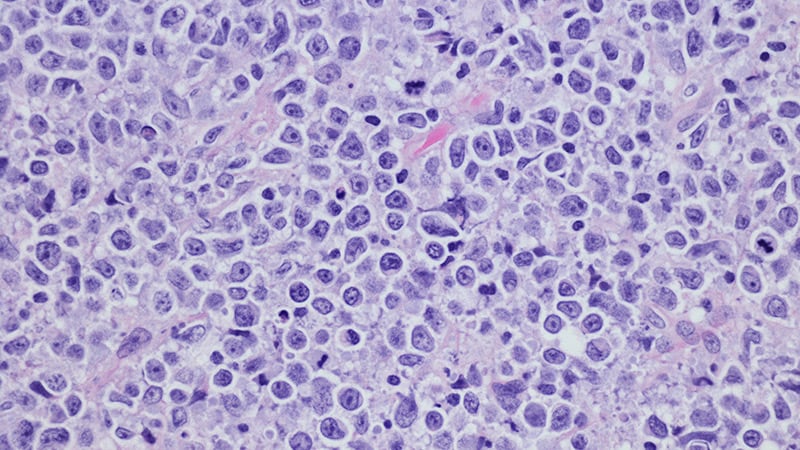Core Concepts
Early-stage cutaneous lymphoma presents challenges in diagnosis and treatment, emphasizing the need for improved prognostic tools and personalized therapies.
Abstract
Introduction:
Early-stage cutaneous lymphoma (CL) symptoms mimic nonmalignant skin diseases.
Misdiagnoses lead to missed treatment opportunities.
Disease Management Challenges:
Lack of prognostic tools and customized treatment hinders disease management.
20%-30% of CL patients progress to an advanced stage.
5-year survival rate in advanced CL patients can be as low as 30%.
Biomarker Studies:
Increased tumor clone frequency predicts aggressive disease in early-stage CL.
TCF greater than 25% indicates higher risk of progression.
Biomarker studies crucial for improving patient outcomes.
Treatment Approaches:
Skin-directed treatment for early-stage CL.
Allogeneic hematopoietic stem cell transplantation not suitable for all patients.
New agents like Brentuximab vedotin and mogamulizumab show promise in treating relapsed or refractory CL.
Individualized Treatment:
Radiation and chemotherapy necessary for some patients with advanced CL.
Tailoring treatment crucial due to disease heterogeneity.
Emphasis on the need for better and safer treatments.
Expert Insights:
Challenges in diagnosing and treating cutaneous lymphomas highlighted.
Treatment delays due to misdiagnosis are common.
Importance of skin biopsy for accurate diagnosis and treatment.
Misdiagnoses Among Challenges in Managing Cutaneous Lymphoma
Stats
An estimated 20%-30% of patients with CL progress to an advanced stage.
5-year survival rate in advanced CL patients can be as low as 30%.
Patients with a TCF greater than 25% are more likely to have aggressive disease.
Quotes
"Cutaneous lymphoma is difficult to diagnose. Even when it is properly diagnosed, we do not have widespread use of biomarkers to predict if a patient will progress to a dangerous disease state." - Patrick M. Brunner, MD, MSc
"Treatments are palliative, they're just suppressing the disease. We definitely need better and safer treatments for our patients." - Patrick M. Brunner, MD, MSc
Key Insights Distilled From
by Myles Starr at www.medscape.com 12-02-2023
https://www.medscape.com/viewarticle/999008
Deeper Inquiries
How can the development of prognostic tools impact the outcomes of patients with cutaneous lymphoma?
The development of prognostic tools in cutaneous lymphoma can significantly impact patient outcomes by helping to predict disease progression and tailor treatment plans accordingly. By identifying patients at higher risk of advancing to a dangerous disease state, these tools can enable healthcare providers to intervene earlier with more aggressive therapies or closely monitor high-risk patients. This proactive approach can potentially improve survival rates and overall quality of life for individuals with cutaneous lymphoma. Additionally, prognostic tools can aid in stratifying patients based on their risk profile, allowing for personalized treatment strategies that are more effective and better tolerated.
What are the implications of delayed treatment due to misdiagnosis on patient prognosis and overall disease management?
Delayed treatment due to misdiagnosis in cutaneous lymphoma can have detrimental implications on patient prognosis and disease management. Misdiagnosing early-stage cutaneous lymphoma as a benign skin condition like psoriasis or eczema can lead to missed opportunities for appropriate treatment, allowing the disease to progress unchecked. As cutaneous lymphoma advances, it becomes more challenging to treat and may require more aggressive interventions with potentially lower success rates. Furthermore, delayed treatment can result in a poorer overall prognosis, decreased quality of life, and increased healthcare costs. Timely and accurate diagnosis is crucial in ensuring optimal outcomes for patients with cutaneous lymphoma.
How can advancements in personalized medicine revolutionize the treatment landscape for cutaneous lymphoma patients?
Advancements in personalized medicine have the potential to revolutionize the treatment landscape for cutaneous lymphoma patients by offering tailored therapies based on individual characteristics and disease profiles. Personalized medicine takes into account factors such as genetic makeup, biomarkers, and disease progression patterns to customize treatment plans that are more precise and effective. This approach can lead to improved treatment outcomes, reduced side effects, and better patient adherence. By targeting specific molecular pathways or genetic mutations associated with cutaneous lymphoma, personalized medicine can enhance the efficacy of treatments while minimizing unnecessary interventions. Overall, personalized medicine holds promise in optimizing the management of cutaneous lymphoma and improving patient care.
0
